The Economics and Statistics Division maintains archives of previous publications for accountability purposes, but makes no updates to keep these documents current with the latest data revisions from Statistics Canada. As a result, information in older documents may not be accurate. Please exercise caution when referring to older documents. For the latest information and historical data, please contact the individual listed to the right.
<--- Return to Archive
For additional information relating to this article, please contact:
July 19, 2022LABOUR MARKET OUTCOMES, COLLEGE AND UNIVERSITY CLASS OF 2015 Statistics Canada has released new results from the Post Secondary Student Information System. This tracks median earnings of graduates of post secondary programs.
Although Statistics Canada reports graduates of all ages from 15 to 64, the median incomes reported below were only for those aged between 15 and 34 to avoid income differences that reflect prior experience rather than education.
In 2020, there were a total of 10,150 graduates of Nova Scotia colleges and universities that reported income on their tax return for the year. Of these, the largest numbers were 2015 graduates with:
- A certificate from a career, professional or technical training program (1,410 Nova Scotia graduates in 2015)
- A diploma from a career, professional or technical training program (1,680 Nova Scotia graduates in 2015)
- An undergraduate university degree (5,000 Nova Scotia graduates in 2015)
- A master's degree from a university (1,150 Nova Scotia graduates in 2015)
- A doctorate from a university (60 Nova Scotia graduates in 2015)
- A degree from a university professional program (110 Nova Scotia graduates in 2015)
Median earnings for 2015 graduates that report income varies by the type of program. Note that this excludes those who returned full time for further study.
Graduates from professional university programs reported the highest median income 5 years after graduation ($104,100) while graduates of career/technical certificate programs reported the lowest median incomes ($36,200). Those who graduated with doctorates ($83,900) and masters degrees ($75,800) reported higher median incomes in 2020 than those with undergraduate degrees ($57,400).
Nova Scotia graduates' median incomes were less than the national average for career/technical certificate and diploma graduates as well as university undergraduate and doctoral graduates. Nova Scotia median earnings were higher for graduates of university professional and masters programs.
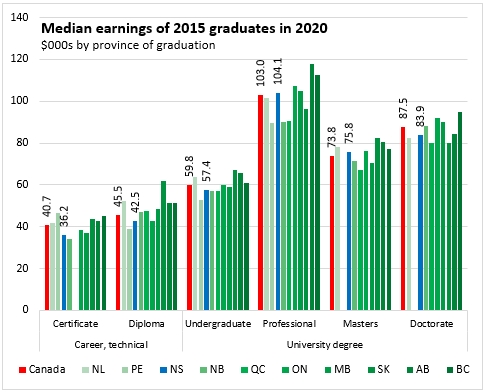
At every level of education for Nova Scotia's 2015 graduates, male median earnings exceeded female earnings. In absolute dollar values, the largest earnings gap between males and females was for professional university program graduates. In percentage terms, the largest female to male earnings gap was for those with career/technical certificates.
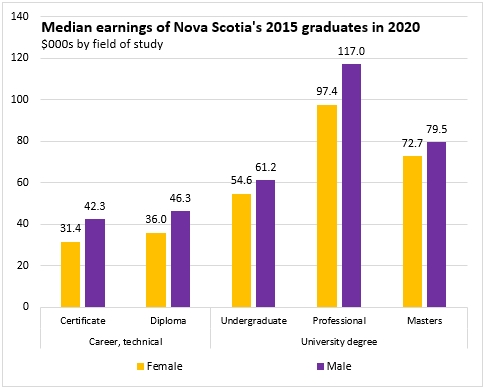
By field of study for Nova Scotia's class of 2015, those who completed a certificate program in architecture, engineering and related fields reported the highest median earnings while those who completed a personal, protective or transportation-related field reported the lowest median income.
Note that not all fields of study are offered for each education level.
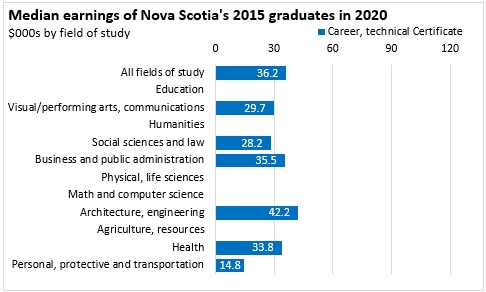
Among those who completed a career/technical diploma, graduates from math/computer science and health fields also reported higher median incomes (along with architecture/engineering and related fields). Visual and performing arts/communications as well as agriculture/resources graduates of career and technical diploma programs reported lower median incomes (along with personal/protective/transportation).
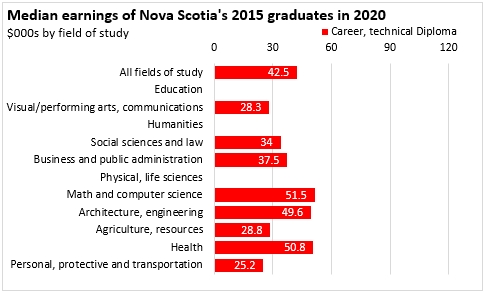
Nova Scotia in the class of 2015 with undergraduate degrees in health, architecture/engineering, math/computer science and education reported higher median incomes. Those with undergraduate degrees in visual/performing arts and communications as well as humanities reported lower median incomes.
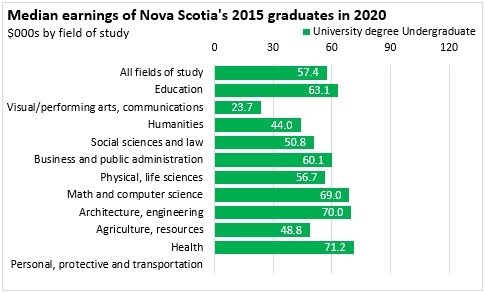
Among those completing masters degrees in Nova Scotia, graduates of education programs reported the highest median incomes, followed by those who completed studies in business, management and public administration. Those with masters degrees in humanities reported the lowest median incomes.
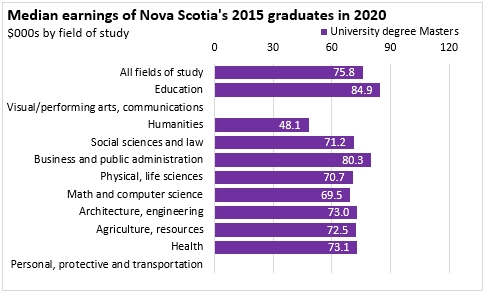
Among the few Nova Scotia graduates with doctoral degrees, the median income was $83,900. However, only those with physical and life sciences doctorates had sufficient information on which to report median incomes and these (at $66,900) were lower than those who graduates in similar fields at the masters level.
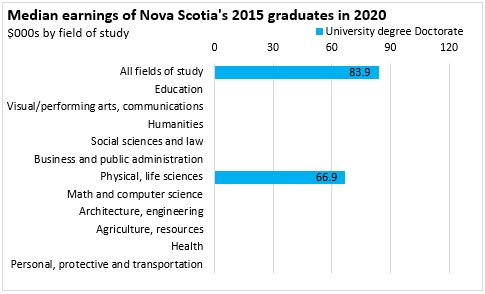
As with doctorates, there are only a limited range of professional programs offered at Nova Scotia universities. Graduates from these programs reported the highest median incomes in 2020, notably in social sciences/law ($100,400) and health related fields ($104,900).
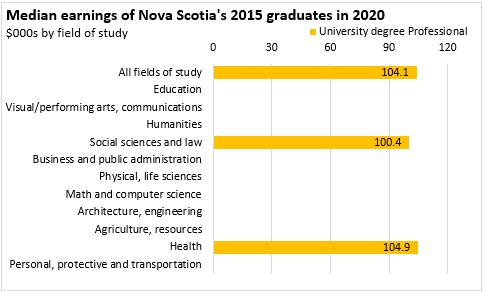
Source: Statistics Canada. Table 37-10-0114-01 Characteristics and median employment income of postsecondary graduates five years after graduation, by educational qualification and field of study (primary groupings)
<--- Return to Archive